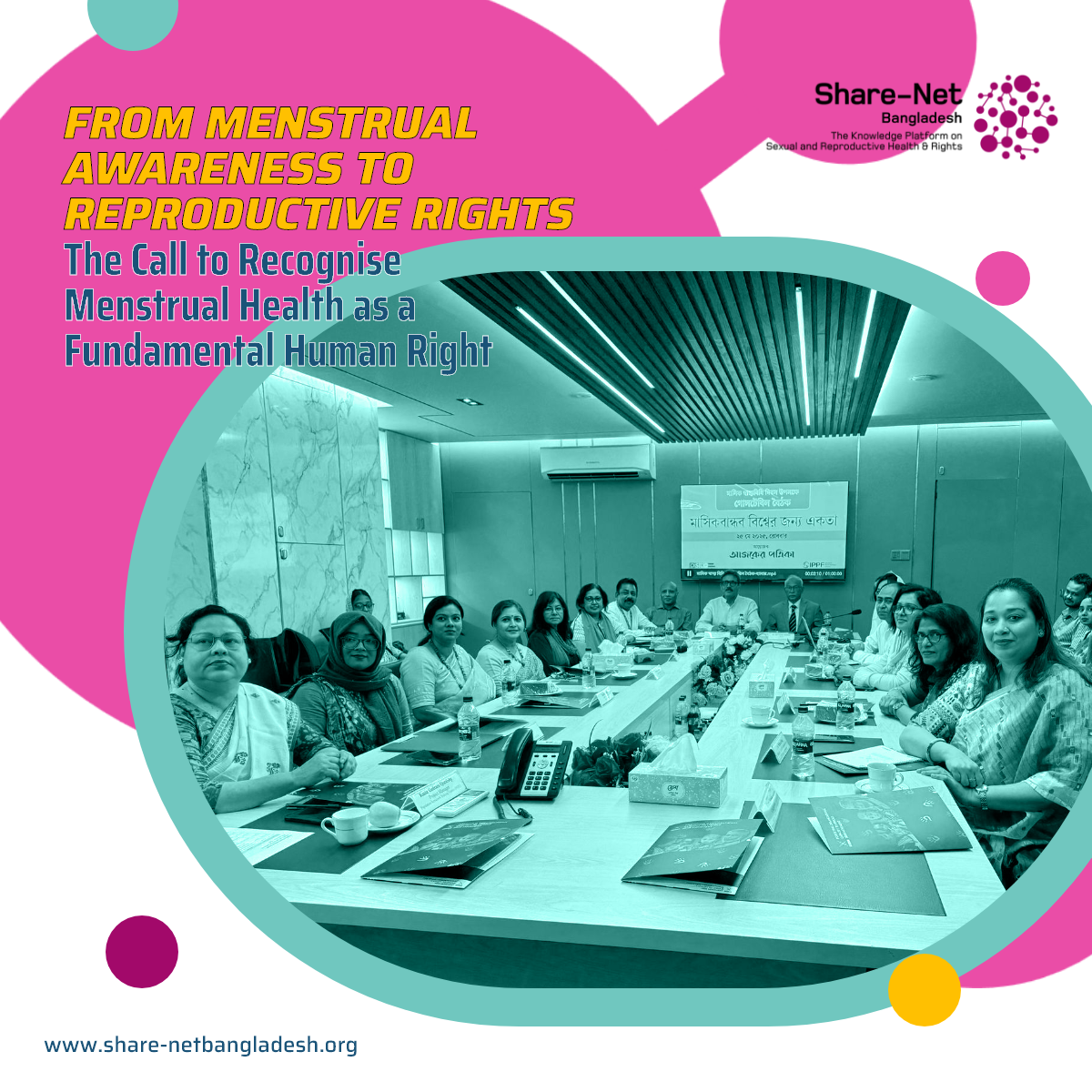From Menstrual Awareness to Reproductive Rights: The Call to Recognise Menstrual Health as a Fundamental Human Right
“It was 1980. My cousin had her first period. My aunt told her husband that their daughter had ‘fallen ill.’ Upon hearing this, my uncle went to the market and returned with sanitary pads and sweets. Handing over the pads to my aunt, he said it was for their daughter’s care. When my aunt asked about the sweets, he replied, ‘Distribute them among everyone and announce that our daughter has started menstruating.’ Shocked, my aunt asked, ‘How can I speak publicly about something so shameful?’ My uncle calmly responded, ‘Today, I’m reassured that my daughter is normal.’”
This memory, shared by Dr Md Monzur Hossain, Programme Manager at the Directorate General of Family Planning, at a recent roundtable titled “Uniting for a Period-Friendly World,” reflects an exception to the norm—but it should have been the standard. How humane a society is can often be gauged by its sensitivity toward women. In that light, menstrual and reproductive health management is one of the most fundamental indicators of societal compassion.
The roundtable, held on May 25 to mark Menstrual Hygiene Day, was organised by Ajker Patrika, in association with Population Services and Training Centre (PSTC) and International Planned Parenthood Federation (IPPF). The discussion highlighted a stark reality: menstruation, a natural bodily function, is still steeped in shame, silence, and institutional neglect.
Speakers at the event called for dismantling age-old stigmas and demanded the recognition of sexual and reproductive health rights—including menstrual health—as a basic human right.
Anita Sharif Chowdhury, Team Leader at PSTC, shared a striking statistic in her presentation: nearly 80% of women in the country still do not feel comfortable speaking openly about menstruation. This silence, she argued, is not just about biology—it’s a violation of dignity and health rights. For marginalised women, including those with disabilities, slum dwellers, or indigenous communities, menstruation often becomes a significant barrier to participation and well-being.
The roundtable also underscored the lack of women-friendly toilets, the high cost of sanitary napkins, and the absence of environmentally sound disposal systems—all of which compound health risks. Speakers stressed that the shame and fear surrounding menstruation hurt adolescent girls’ confidence and education. For many, attending school, playing sports, or participating in social activities becomes difficult during their periods.
Dr Farhana Haque, Director (Health Communications) at RedOrange Communications and Country Coordinator of Share-Net Bangladesh, said, “Menstruation is often portrayed to adolescent girls in such a terrifying way that it leaves them anxious and afraid.”
Mahbuba Haque Kumkum, a senior trainer at MDF Bangladesh, raised a pressing issue around disposal: “What happens during floods? How do schoolgirls manage? The problem is far worse in rural and marginalised areas.”
Kaniz Gofrani Quraishi, Project Manager at PSTC, linked the issue to maternal health: “May 28 is also Safe Motherhood Day. The two are deeply connected. If menstrual health is not managed properly, motherhood becomes risky.”
The discussion called for more than just research and discourse—it demanded action. Participants emphasised the need to integrate menstrual health education into school curricula, introduce period support packages in disaster-prone areas, allow the sale of individual sanitary pads at local shops, ensure proper toilets and leave policies for working women, and incorporate menstrual awareness into human resource practices.
Ms. Nandinee Lopa, Country Coordinator of the World Bank’s Global Financing Facility (GFF), said, “We must build sustainable and affordable systems to deliver menstrual health products to the doorstep of marginalised communities. No one should be denied access to this essential health service because of economic inequality.”
In his closing remarks, Dr Nur Mohammad, Executive Director of PSTC and moderator of the roundtable, said:
“The voice we have raised around menstruation—this is what we want to amplify. That is the core purpose of this dialogue. Every member of the family must be made to understand that menstruation is not a forbidden subject. And teachers must be encouraged to speak about it not behind closed doors, but openly, in front of their students.”
Sexual and reproductive health is not solely a women’s issue—it is a question of social justice. Above all, there is no logical reason to keep menstruation shrouded in secrecy. It’s hightime we bring this silent revolution into public discourse. To create a truly period-friendly society, we must adopt an inclusive and dignified perspective. The time has come to act—and to speak.

